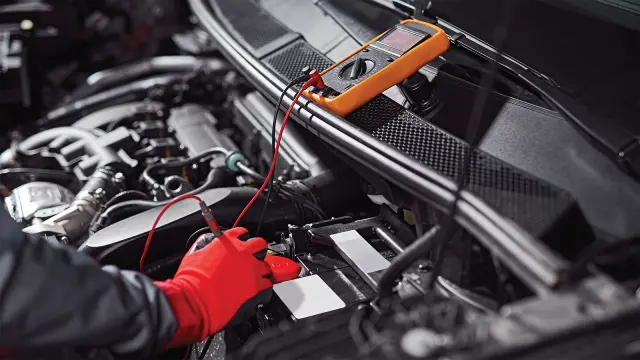In a country where monsoon brings extremely rampant torrential rains, it is natural that your car and its systems will be impacted. While everyday cars are designed to withstand various weather conditions but extended exposure to moisture and water can lead to several issues that can make driving your car unsafe:
- Water ingress and leakage
Constant exposure to moisture, rainwater and floodwater can lead to water entering into the car. Thus parts that are not water resistant can significantly suffer from the same. If water enters the engine bay, interior compartments and other sensitive areas can lead to potential damage to sensitive electronic components. - Corrosion and Oxidation
The presence of moisture or water can become a catalyst for the corrosion process. Considering most of the components of a car are made of metal, corroded parts like wires and connectors can cause poor electrical conductivity. This may lead to malfunctions or even failures of various car electrical systems. - Short Circuits
Water collection, or even moisture, can lead electrical components to short circuit. Car's essential systems, like engine control module, sensors, ignition system and lighting system, can be affected. This can lead to sudden malfunctions that range from minor inconveniences to serious safety hazards. - Malfunctioning Sensors
Today, several modern cars rely on sensors to monitor various parameters and provide inputs regarding the car's systems. Any water exposure, be it moisture or water leakage, can disrupt the functions of sensors such as the engine management system, lock-window control system, anti-lock braking system, and traction control, amongst others. - Ignition Issues
Water or moisture in the ignition system can cause difficulties in starting the engine. Wet spark plugs, ignition coils and other ignition components can lead to reduced engine performance and result in poor fuel efficiency. - Battery Problems
Prolonged exposure to moisture can corrode car’s battery terminals which over time reduces the battery's ability to deliver uninterrupted power. This can result in starting issues and overall electrical system instability. - Lags in Infotainment and Electronics
Prolonged exposure to moisture can damage the car's infotainment system and its dashboards too. Additionally, touchscreen, certain buttons and other electronic components might malfunction or become unresponsive altogether. - Flickering and Diminished lights
As moisture seeps into the fixtures of exterior lights such as headlights, tail lights and indicator lights-- this can not only lead to lesser visibility due to ineffectiveness but also pose a safety hazard. - Fuse and Relay issues
Water seepage or even prolonged moisture can lead to corrosion on fuses and relays which can potentially cause them to fail. Additionally, this can lead to the failure or inability of various electrical systems to work to the fullest of their abilities. - Brake and ABS System issues
Water seepage into the brakes' system can lead to reduced performance or even temporary loss of braking ability. The Anti-Lock Braking System (ABS) may also be compromised if its sensors and control unit have prolonged moisture exposure.
Now that you know the effects of monsoons on the car's electrical system, here are a few ways to reduce the impact of monsoons on your car’s maintenance:
- Regular Maintenance: Take your car for the recommended services to keep a check on its electrical components. Ensure that the car's components, especially its brake system, battery terminals, connectors, and wiring, are in a good condition.
- Waterproofing: Applying waterproof electric tape or waterproof sealants to vulnerable electrical connections can help prevent moisture from causing corrosion.
- Responsible parking: Whenever possible, park your car in a covered area or use a car cover to shield it from the onslaught of heavy rains, leaves and other debris.
- Avoid waterlogged areas: During monsoons, try not driving on waterlogged roads as you know water can damage the engine and electrical systems. If you must drive through water, do so cautiously and at a slow speed.
If you still have any doubts, head over to your nearest Bosch Car Service Center. By choosing Bosch for your car’s seasonal maintenance needs and car electrical system repairs, you can trust in their expertise, use of genuine parts, and commitment to customer satisfaction. You can count on Bosch service centres to deliver comprehensive services to ensure your vehicle's maintenance.
If, despite following all of the above precautionary tips, you still feel that your car has been affected by rainwater or moisture— visit your nearest Bosch Car Service centre for car repair services during monsoon. By choosing Bosch, you can trust the best for your car’s seasonal maintenance needs, as they will only give your car the treatment it deserves. Entrust your car in the hands of experts, as they only use genuine parts and are committed to delivering the best, keeping customer satisfaction in mind. Book your nearest best car service for monsoon today.

